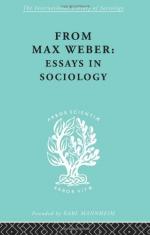|
This section contains 7,242 words (approx. 25 pages at 300 words per page) |

|
SOURCE: "Beaurocracy in Art and Analysis: Kafka and Weber," in Journal of the Kafka Sociely of America, Nos. 1-2, 1991, pp. 4-16.
In the following essay, Derlien examines the Weberian influence in the works of Franz Kafka.
Sociology of literature is based upon the assumption that literary fiction, through the personal concern of the artist, reflects societal conditions. Yet, surprisingly little sociological work has been undertaken to analyze the reflection in literature of bureaucracy as a social phenomenon—at least in the German speaking countries. Elsewhere the administrative novel as a special genre has been extensively discussed (Egger 1959; Kroll 1965; Savage 1965; McCurdy 1973) and anthologies edited (Coser 1963; Holzer, et al. 1979) to teach the sociology of bureaucracy through literature. This neglect of the bureaucratic contents of German literary fiction in general, and of Franz Kafka's in particular, is all the more astonishing as Kafka's older contemporary Max Weber (1864-1920) is commonly regarded...
|
This section contains 7,242 words (approx. 25 pages at 300 words per page) |

|


